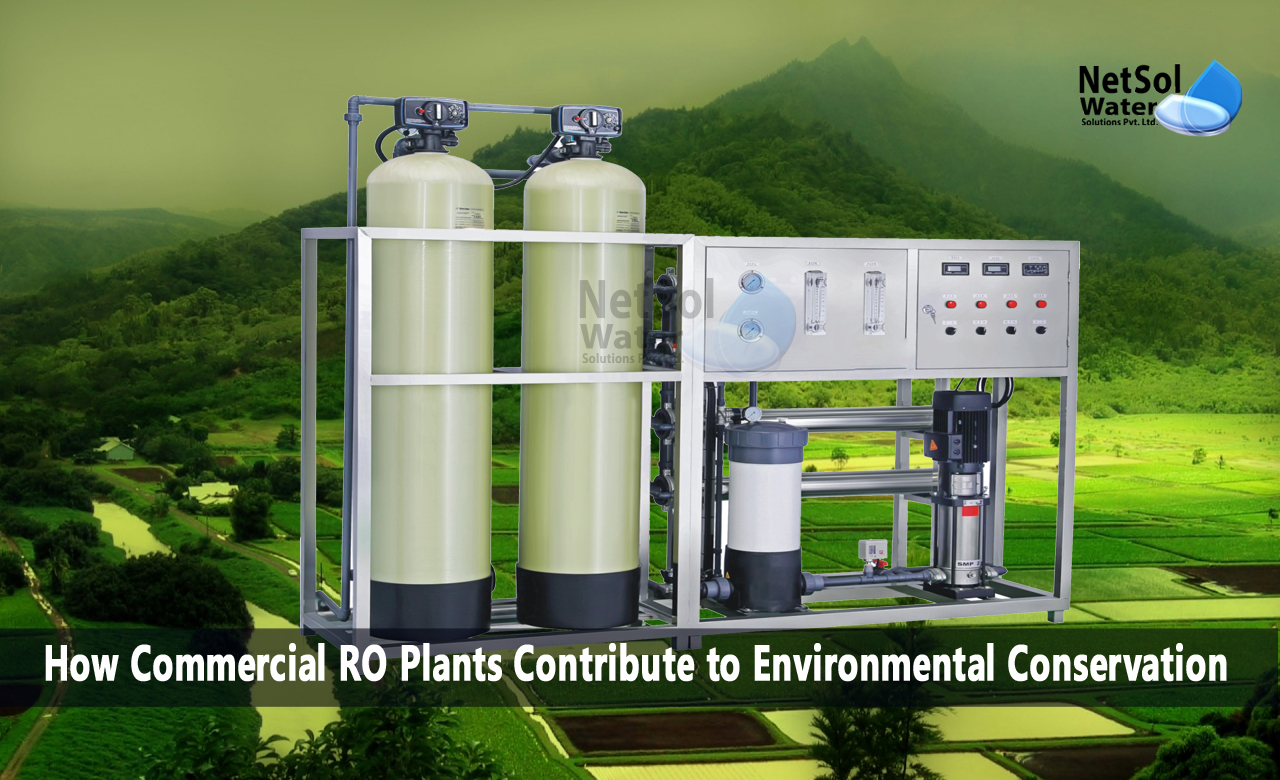How Commercial RO Plants Contribute to Environmental Conservation?
As the world grapples with environmental challenges, including water scarcity and pollution, the need for sustainable solutions has become paramount. Commercial reverse osmosis (RO) plants are at the forefront of the green revolution, offering a range of benefits that contribute to environmental conservation.
Here we will see how commercial RO plants promote sustainability, reduce ecological impact, and pave the way for a greener future.
Water Conservation and Efficiency:
1. Optimal Resource Utilization
Commercial RO plants help conserve water by efficiently utilizing available resources. Through the RO process, these plants can treat various water sources, including brackish water and seawater, making use of previously untapped resources. This reduces the strain on freshwater reserves and promotes sustainable water management.
2. Wastewater Treatment and Recycling
RO plants play a crucial role in wastewater treatment and recycling. They enable the purification of wastewater, transforming it into reusable water for non-potable applications such as irrigation, industrial processes, and environmental restoration. By recycling water, RO plants minimize the discharge of wastewater into natural ecosystems, reducing pollution and conserving freshwater resources.
Energy Efficiency and Carbon Footprint Reduction
1. Advanced Energy Recovery Systems
Commercial RO plants have witnessed significant advancements in energy recovery technology. Energy recovery devices, such as pressure exchangers and turbochargers, harness the energy of the reject stream to drive the RO process. This reduces the overall energy consumption of the plant, resulting in lower operational costs and a reduced carbon footprint.
2. Renewable Energy Integration
In line with the green revolution, commercial RO plants increasingly integrate renewable energy sources, such as solar and wind power, into their operations. By utilizing clean and renewable energy, these plants further reduce their environmental impact and contribute to the transition to a low-carbon economy.
Reduction of Chemical Usage:
1. Enhanced Pre-Treatment Processes
Commercial RO plants employ advanced pre-treatment processes that effectively remove contaminants, reducing the need for excessive chemical usage. Through techniques like coagulation, flocculation, and sedimentation, suspended particles, organic matter, and other impurities are efficiently removed, resulting in cleaner water with minimized chemical requirements.
2. Eco-Friendly Cleaning Techniques
Periodic cleaning is essential for maintaining the performance and lifespan of RO membranes. Commercial plants now employ eco-friendly cleaning techniques that minimize the use of harsh chemicals, thereby reducing environmental impact. This includes using biodegradable cleaning agents and optimizing cleaning protocols to maximize efficiency and minimize chemical waste.
Preservation of Ecosystems and Biodiversity:
1. Protection of Water Sources
Commercial RO plants contribute to the preservation of ecosystems and biodiversity by ensuring the protection of water sources. By treating and purifying water, these plants prevent the discharge of pollutants and contaminants into rivers, lakes, and other natural water bodies, safeguarding aquatic ecosystems and the organisms that rely on them.
2. Mitigation of Water Pollution
RO plants actively mitigate water pollution by removing various contaminants, including chemicals, heavy metals, and microorganisms. By producing high-quality treated water, these plants minimize the negative impacts on aquatic life and protect fragile ecosystems from the adverse effects of pollution.
Public Health and Environmental Justice:
1. Improved Access to Safe Water
Commercial RO plants contribute to public health by providing access to safe and clean water. The removal of harmful contaminants ensures that communities have access to water that meets rigorous quality standards, reducing the risk of waterborne diseases and improving overall well-being.
2. Equitable Distribution of Water Resources
Commercial RO plants play a crucial role in promoting environmental justice by facilitating equitable distribution of water resources. These plants can be strategically located in underserved areas or regions with limited access to clean water, ensuring that disadvantaged communities have access to safe and reliable water supplies.
Summary:
Commercial RO plants are catalysts for environmental conservation and sustainability. Through water conservation, energy efficiency, reduced chemical usage, and the preservation of ecosystems, these plants are driving the green revolution. By embracing the advancements in RO technology and promoting sustainable practices, we can create a more resilient and environmentally friendly future, where access to clean water goes hand in hand with responsible resource management and a thriving planet.
Leading manufacturer of sewage treatment plants in India.
Netsol Water is the leading manufacturer, supplier, and exporter of a quality selection of water treatment, and wastewater treatment products in India, by using advanced sewage treatment methods.
RO plants, water softeners, ETPs, STPs, DM plants, AMC, O&M, Ultra filtration, UV, Ozonation, ZLD plants, Anoxic tanks, and other goods and services are available from us. We also provide services to businesses in sectors including automotive, pharmaceutical, textile, pulp & paper, beverages, refineries, schools, hospitals, office buildings, and hotels, among others.
Netsol Water is Greater Noida-based leading water & wastewater treatment plant manufacturer. We are industry's most demanding company based on client review and work quality. We are known as best commercial RO plant manufacturers, industrial RO plant manufacturer, sewage treatment plant manufacturer, Water Softener Plant Manufacturers and effluent treatment plant manufacturers. Apart from this 24x7 customer support is our USP. Call on +91-9650608473, or write us at enquiry@netsolwater.com for any support, inquiry or product-purchase related query.



